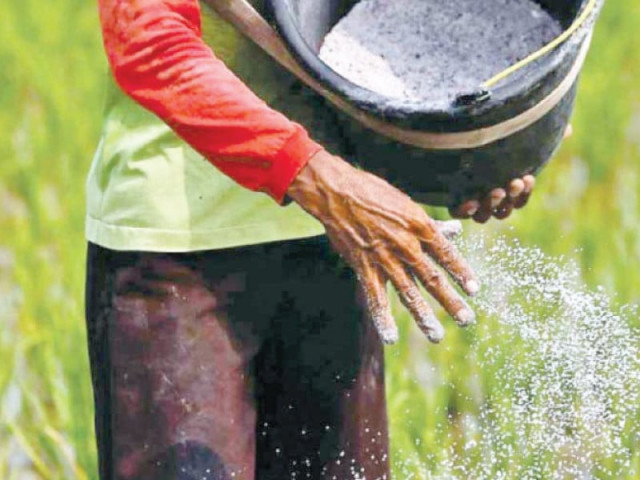Govt seeks hefty cut in DAP prices
Minister urges fertiliser firms to slash prices by Rs3,000 to reduce input cost of crops

The government on Friday asked fertiliser manufacturers to slash prices of di-ammonium phosphate (DAP) by Rs3,000 per bag to provide relief to farmers, who are reeling from high inflation and soaring input costs.
The demand for price reduction was placed in a meeting of the Fertiliser Review Committee, headed by Federal Minister for Industries, Production and National Food Security Rana Tanveer Hussain. The meeting was called to assess the stock position of DAP and urea for the 2024-25 Rabi crop planting season.
The industries minister urged representatives of fertiliser companies to push down DAP prices from the high of Rs12,000 to Rs9,000 per bag.
During the meeting, it was informed that fertiliser firms were already charging farmers higher prices for DAP, which should be reduced to provide relief to the hard-pressed growers.
Agriculture is the mainstay of Pakistan's economy and a good growth in the sector leads to a higher growth in the overall economy, as seen in the last fiscal year.
Representatives of fertiliser manufacturers, however, did not agree on the reduction in DAP prices, saying they would place the matter before their management for a suitable response.
During the meeting, it was highlighted that total urea supplies for industrial and non-agricultural consumption were calculated at 22,000 tonnes during financial year 2023-24.
Urea demand often exceeds domestic production of this vital input for crops. Hence, the supply-demand gap is required to be filled through imports.
Meeting participants proposed that sales of locally produced urea may be restricted for the purpose of agricultural production while the industrial demand for fertiliser may be met through imports.
They suggested that local urea may be provided for industrial use only during the lean months of April, May and October, having average offtake of 500,000 tonnes at the import parity price while maintaining buffer stocks of 300,000 tonnes.
It was also highlighted that the Punjab government had taken an initiative to ensure balanced consumption of fertilisers.
DAP offtake had been estimated at 215,000 tonnes for October 2024, but demand rose 44% to 309,000 tonnes.
The increase stemmed mainly from the disbursement of Rs75 billion by the Punjab government in interest-free loans through the Kissan Card at Rs30,000 per acre. The money was provided for seeds, phosphorus and nitrogen to 500,000 farmers for up to five acres, ie, Rs150,000 per farmer.
Farmers of the province have so far drawn Rs18 billion for the procurement of fertilisers. This initiative of the Punjab government is expected to encourage the farming community to apply more DAP and opt for a balanced use of fertiliser in crop plantations.
The trend of increase in DAP consumption, observed in October, is expected to continue through November and December 2024.
Speaking at the huddle, Industries and Production Minister Rana Tanveer Hussain assured stakeholders that additional fertiliser stocks were available in the country to meet the need of farmers, which would help them achieve higher yields of their crops during the Rabi sowing season.
He emphasised that the prosperity of farmers was crucial for the country's progress and urged provinces to take stern action against fertiliser hoarding and price manipulation.
The meeting was attended by Ministry of Industries Secretary Saif Anjum, Ministry of National Food Security Secretary Ali Tahir, senior officials of the Ministries of Finance, Commerce, National Food Security and Industries as well as representatives of provincial governments and other stakeholders.




















COMMENTS (1)
Comments are moderated and generally will be posted if they are on-topic and not abusive.
For more information, please see our Comments FAQ